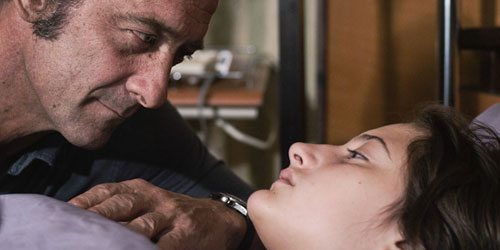
 Claire Denis has a peculiar take on justice: she doesn’t seem to believe it exists. In “Bastards”, her first film since the astonishing “White Material”, she portrays her darkest version of the world to date, a place where people have become so corrupt that suicide is the only way out, a place where young women enter perverse relationships with pimps and their even wickeder clients, in hopes of just “feeling” something. In the first scene a man jumps off a window towards his death. His wife (Julie Bataille) is interviewed by police women and we see a young naked woman (Lola Créton) walk aimlessly down the street wearing nothing but high heels. Are these images connected? What do these people have to do with each other?
Claire Denis has a peculiar take on justice: she doesn’t seem to believe it exists. In “Bastards”, her first film since the astonishing “White Material”, she portrays her darkest version of the world to date, a place where people have become so corrupt that suicide is the only way out, a place where young women enter perverse relationships with pimps and their even wickeder clients, in hopes of just “feeling” something. In the first scene a man jumps off a window towards his death. His wife (Julie Bataille) is interviewed by police women and we see a young naked woman (Lola Créton) walk aimlessly down the street wearing nothing but high heels. Are these images connected? What do these people have to do with each other?
Vincent Lindon stars as Marco Silvestri, a mysterious man who moves into a luxurious, spacious apartment in order to spy on Raphaëlle (Chiara Mastroianni) a woman who lives with her small son and is visited by her lover, an older influential man by the name of Edouard Laponte (Michel Subor). Marco begins an affair with Raphaëlle and we discover that he is the uncle of the young woman we saw in the first scene. Denis doesn’t care much about letting us in, into her film’s secrets. We really don’t know where the plot is going, how to begin solving the puzzle or if there’s even a puzzle to begin with, but we realize that we are so enthralled by the power of her images that we don’t really care where she takes us.
Denis has confessed to being a sinister person who thinks of dialogues in her films as a prison that restricts her shooting plan and withholds her best writing. The people in her movies, and in this one in particular, are more like animals who act upon purely primal necessities. In one of the film’s strangest sequences, Marco and Raphaëlle have sex on a staircase, letting us know their need was so urgent they didn’t have time to get inside a room. “Bastards” ironically is not without a sense of humor, as Denis makes comments on voyeurism by making Grégorie Colin - the object of desire from her masterful “Beau travail” - play a pimp obsessed with giving clients the best views possible.
As “Bastards” approaches its ending, we learn more and more about how the images from the beginning were connected and for its lurid qualities and love for deceit, it must be said that this isn’t an exploitative film. It will most likely enrage audience members expecting a happy resolution but in its nihilism there is hope if not for society, for Denis’ ability to transform disturbing depictions of our darkness demons into mesmerizing screen moments.